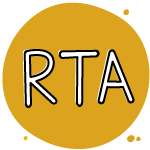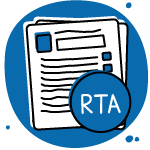

2.1 What is the RTA?
The Residential Tenancies Authority (the ‘RTA’) is the Queensland Government statutory authority responsible for providing a range of residential tenancy services in Queensland. The RTA administers the Act on and provides a wide range of tenancy based services for all parties to a tenancy agreement, including tenants, residents, lessors, agents and rooming providers.
RTA services include:

2.2 RTA forms
The RTA website provides tenancy forms used for general tenancies (flats, units, houses etc), rooming accommodation tenancies (room only with shared facilities) and moveable dwelling tenancies (renting a site or a van in a caravan park).
RTA forms are available online at www.rta.qld.gov.au The RTA can also post forms out to clients if requested. Call the RTA on 1300 366 311
The following is a list of common tenancy forms used in general tenancies.
| Form 20 | Notice ending tenancy interest (domestic and family violence) |
| DFV Report | Domestic and family violence report |
| Form 4a | Bond refund for persons experiencing domestic and family violence |
| Continuing interest | Continuing interest notice |
| Form 18a | General tenancy agreement |
| RTA Form 1a | Entry Condition Report |
| RTA Form 2 | Bond Lodgement form |
| RTA Form 3 | Change of rental property |
| RTA Form 4 | Refund of Rental Bond |
| RTA Form 5 | Change of lessor, agent or manager/provider |
| RTA Form 6 | Change of bond contributors |
| RTA Form 9 | Entry notice |
| RTA Form 10 | Notice of lessor’s intention to sell premises` |
| RTA Form 11 | Notice to remedy breach |
| RTA Form 12 | Notice to leave |
| RTA Form 13 | Notice of intention to leave |
| RTA Form 14a | Exit condition report |
| RTA Form 15 | Abandonment termination notice |
| RTA Form 16 | Dispute resolution request |
| RTA Form 19 | Notice to vacate from mortgagee to tenant/s |
There are specific RTA forms domestic and family violence.

2.3 Notice ending tenancy interest (domestic and family violence) (Form 20)
The Notice ending tenancy can be used by either a sole tenant or a co-tenant; to give 7 days notice where they no longer feel safe to continue to occupy the premises due to domestic violence that they are experiencing.
2.4 Domestic and family violence report
The DFV Report can be signed by an authorised professional to provide supporting evidence of domestic and family violence.
2.5 Bond refund for persons experiencing domestic and family violence (Form 4a)
When a tenant gives a Notice ending tenancy Form 20, they can apply for the bond refund using this Form 4a . This form needs to be sent via email to the RTA at the address on the form. The RTA deals with these types of bond refunds confidentially.
2.6 Continuing interest notice
The Continuing interest notice is the form that the lessor/agent can use to inform a remaining co-tenant that their co-tenant has given a Notice ending tenancy due to DFV. And that the tenancy will continue for the remaining co-tenant.
2.7 Notice of Intention to Leave – RTA Form 13
A notice to end a tenancy must be given in writing. Tenants must use a Notice of Intention to Leave-RTA Form 13 to advise the lessor/agent of their intention to leave the rental property by a certain date (the handover date).
If tenants are ending a fixed term agreement early (eg: breaking the lease) a Notice of Intention to Leave is still valid, even If the date the tenant is moving out is before the end of a fixed term lease. However a tenancy agreement is a legally binding contract. Lessors/agents may seek compensation from tenants for breach of the agreement and early termination of their tenancy.
If tenants need to leave a fixed term tenancy early due to a serious reason, such as domestic violence, instead of giving a Notice of Intention to Leave, tenants may choose to apply to QCAT for an urgent hearing and seek an order to terminate their tenancy.
While waiting for the QCAT hearing date, if tenants need to move out prior to the hearing, it is always a good idea give the lessor or agent written notice confirming the date the tenant moved out and returned the keys, or intends to move out and return all keys to the lessor/agent .

2.8 Dispute Resolution Request – RTA Form 16
The RTA Dispute Resolution Service provides free telephone conciliation service to assist parties resolve a tenancy dispute. The role of the RTA is to remain impartial and assist parties to communicate and reach a voluntary agreement to settle their dispute.
To apply to the RTA parties must fill in a Dispute Resolution Request -RTA Form 16 and lodge it with the RTA. For all non-urgent tenancy disputes parties must apply to the RTA, and attempt to resolve their dispute, before they can apply to QCAT for a tenancy tribunal hearing.
When applying to the RTA Dispute Resolution Service parties can indicate on the Form 16 if they need an interpreter, or need assistance with reading or writing.
The RTA usually provides dispute resolution over the phone, either through a series of calls to each party, or as a telephone conference with all parties on the phone along with a trained RTA Conciliator.
RTA conciliators are impartial, their aim is to facilitate communication to assist parties to negotiate an agreement. Conciliators cannot make decisions or force people to make an agreement.
If parties are unable to resolve their dispute, or if the RTA considers the matter is not suitable for conciliation (for example if the parties are not willing to participate or exchange information) the RTA will issue a Notice of Unresolved Dispute with a conciliation number. The person who receives this letter then has the option to apply to QCAT for a hearing and a final decision.
Non-urgent matters require RTA conciliation before parties can apply to QCAT for a hearing. These include general disputes about agreements, breach notices, routine repairs, locks and keys, or service charges, and disputes over rent decreases, compensation claims, or bond refunds.
Urgent tenancy matters are defined under s415 of the Act. These matters can go direct to QCAT without the requirement to first seek resolution through the RTA Dispute Resolution Service. However, parties can still use the RTA Dispute Resolution Service if they wish.
Urgent matters include applications to QCAT to terminate a tenancy, remove a tenancy database listing, or seek an order about emergency repairs, or repairs affecting tenant health and safety.


2.9 Exit Condition Report – RTA Form 14a
Tenants need to obtain and complete an Exit Condition Report- RTA Form 14a to record the condition of the premises when they leave. Tenants can also take photos and keep copies of cleaning receipts as further evidence they have met their obligations.
Tenants must give the lessor/agent a copy of the completed Exit Condition Report when they move out and hand back the keys. The lessor/agent then has three (3) business days to inspect the property, add their comments to the form and return a copy to the tenant at their forwarding address stated on the form.
When moving out it is important tenants gather evidence to show they have left the premises clean and undamaged. The Exit Condition Report is the tenant’s record of the condition of the property at the end of the tenancy. This report can provide important evidence if there is a dispute over the bond refund at the end of the tenancy.
QUICK TIPS : At the end of the tenancy
* Leave the property as far as possible in the same condition it was in at the start of the tenancy, except for “fair, wear and tear”.
* Complete and sign the Exit Condition Report and provide a copy to the lessor/agent who must inspect the premises and return a copy to the tenants within 3 business days.
* Tenants should keep a copy of the Exit Condition Report for their own records.
* Tenants can take photos of the property when moving out and gather other evidence.
* If the tenant is liable for water costs make a note of the water meter reading on the Exit Condition Report.
* Tenants can apply for a bond refund online with the RTA’s Web Services
* Advise the RTA of the applicants address (an email address will suffice) so that they can be notified of any disputes.
Tenants Queensland free statewide advice service for tenants
Advice Hours:
9am – 5pm Monday to Friday
Extended hours to 7pm Tuesday & Wednesday

![]()
![]()
![]()
Level 1,
87 Wickham Terrace,
Spring Hill 4000